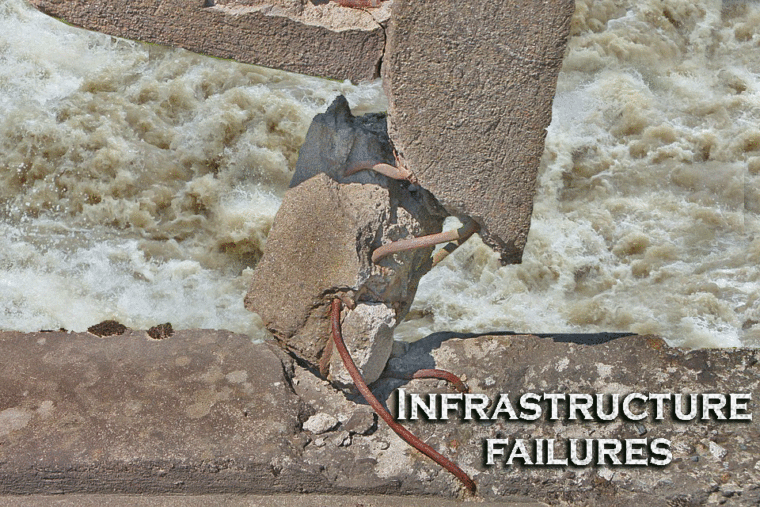
Infrastructure failures are always costly, dangerous and often disastrous. They are occurring all too often these days and are simply symptomatic of the overall state of the country’s infrastructure.
Although the year is young, 2017 has already brought numerous major infrastructures failures in many of the states. California has been hit particularly hard by damages from winter storms, mudslides and floods. Officials estimate that repair of storm damages to the state’s roads, highways and bridges will cost $860 million.
One of the largest infrastructure expenditures California faces is related to the near-catastrophic collapse of the Oroville Dam spillway. Damages to the main spillway were detected in early February. As evacuations of low-lying areas adjacent to the dam were ordered, erosion at the head of the spillway threatened to collapse the dam. Although a collapse of the spillway was avoided, state officials estimate that repairs to the dam’s flood control spillways and hydroelectric plant will exceed $200 million.

The state also is anticipating costs of more than $25 million to repair the Topanga Canyon Boulevard. It was destroyed when heavy rains washed out entire areas. The road will continue to be sporadically shut down for repairs and that only intensifies California’s traffic congestion, which is already monstrous.
Elsewhere in California, the Pfeiffer Canyon Bridge in Monterey County was destabilized after a mudslide which was also a result of heavy rains. Visitors at Big Sur were left stranded from the rest of Highway One. Transportation officials say it will take between nine and 12 months to replace the bridge.
Thirteen people were killed when a bridge in Minneapolis, Minn., collapsed. The bridge was the southeastern boundary of the “Mississippi Mile” of the downtown riverfront parkland.
Seven people died and 200 were injured when an Amtrak train derailed because it was traveling more than 100 miles mph around a curve that required a maximum of half that speed. Safety equipment that could have prevented the accident was available, but because of costs, had not been implemented.
Many reports of bridge damages due to age and stress are being reported across the country. Fortunately, an increasing number of public entities are incorporating new “smart technology” and drones to monitor the “vital signs” of bridges to detect structural changes that can help avoid disasters.
A crack in a supporting truss caused a shutdown on the Delaware River Bridge connecting the Pennsylvania and New Jersey Turnpike. Emergency repair work cost $12 million. Officials in Oakland, New Jersey, were warned by engineers that the Patriots Way Bridge was deteriorating and would require either $1.8 million in repairs or $3 million to replace. Temporary repairs have been put in place over the last six years, but a more permanent repair and rehabilitation of the bridge is expected to cost $250 million. And in Townsends Inlet, N.J., officials discovered a crack in a toll bridge on one of the supporting piers, deeming it unsafe and closing the bridge indefinitely until it can be repaired.
There are “near misses” on many days and a number of recorded infrastructure failures have been caught before a disaster occurred. But, if ever it was time for infrastructure reform in the U.S. – that time is now.
The Department of Transportation has announced $800 million in funding for road and bridge repair. And, $768.2 million has been authorized to help fix infrastructure across 40 states that has been damaged by storms and floods. Ohio has been approved for $61 million for damages caused by flooding. South Carolina is prepared to receive $79 million for road and bridge repair. California will get $124 million for highway repairs.
In spite of that funding, the repairs will barely tip the scales for critical infrastructure needs.
